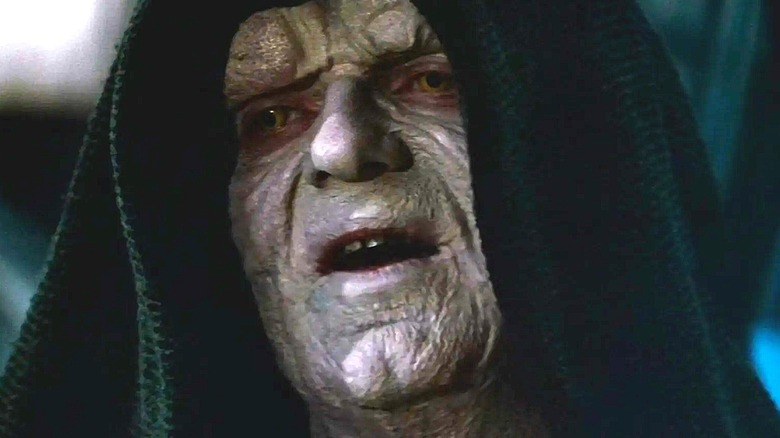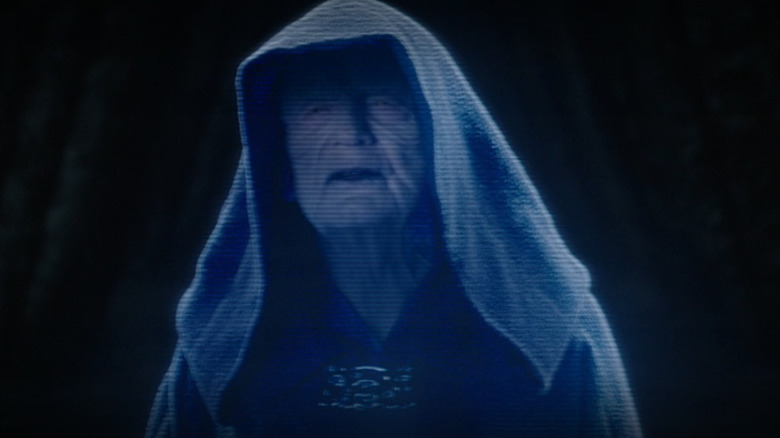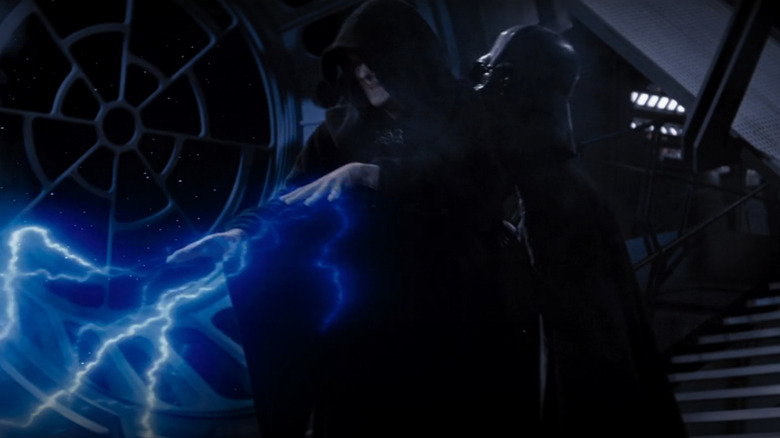How Obi-Wan Kenobi Part VI Sets The Stage For The Emperor's Downfall In Return Of The Jedi
Contains for "Obi-Wan Kenobi" Episode VI
Disney+'s "Obi-Wan Kenobi" occupies a rather unique position in the "Star Wars" canon. Taking place after the prequel trilogy, but before the original films, the series is not only informed by what has already happened in the past, but also by what fans already know about the future. Thus, "Obi-Wan Kenobi" is filled to the brim with Easter eggs and references, making it an absolute treasure cove of lore for those of us that are completely obsessed with "Star Wars." Fans have gotten a chance to see the childhoods of Luke (Grant Feely) and Leia (Vivien Lyra Blair), how the Rebellion began to take form after the events of "Revenge of the Sith," and how the Inquisitors came to power.
Beyond helping to fill in the gaps between the first two sets of live-action "Star Wars" trilogies, "Obi-Wan Kenobi" also helps set the stage for the future. By the end of the series, most of the outfit for Princess Leia is already starting to resemble the one we see in "A New Hope," complete with a holster. Fans have also gotten a chance to see several moments foreshadowed, like the willingness of Obi-Wan (Ewan McGregor) to self-sacrifice in order to allow his friends to escape, as well as Luke saying that he is not afraid when he is told that his home will be under attack, which is a slight nod to his response to Yoda when told about the infamous Dark Side tree on Dagobah. However, it seems as if there is another moment that forecasts the ultimate fate of Emperor Palpatine (Ian McDiarmid) in "Return of the Jedi," but which scene is it?
Palpatine asking if Darth Vader's thoughts are clear foreshadows his downfall
The Emperor himself is a powerful practitioner of the Dark Side and is host to a great number of abilities that some may consider unnatural. Beyond his resistance to physical harm and immortality, the Emperor is also granted a measure of clairvoyance, which is a skill that allows one to peer into the future and observe its myriad twists and turns. He uses this ability to taunt Luke Skywalker (Mark Hamill) at the end of "Return of the Jedi" in an attempt to lure him to the Dark Side. This skill sees only potential futures, though, and these predictions are not set in stone. So perhaps the Emperor missed picking up on the way a conversation with Darth Vader (Hayden Christensen and James Earl Jones) during the events of "Obi-Wan Kenobi" foreshadowed his own eventual downfall in "Return of the Jedi."
After Vader has been defeated by Obi-Wan in Part VI of "Obi-Wan Kenobi," he reports to the Emperor and says that he will stop at nothing to find and destroy Obi-Wan. The Emperor shows a subtle wince of disapproval, which Vader picks up on. Palpatine then admonishes Vader and says, "I wonder if your thoughts are clear on this, Lord Vader." After a momentary delay, Vader answers and says that he is essentially an object of Palpatine's will, and abandons his pursuit of the wayward Jedi. But as Twitter user @malewife_saber pointed out using a series of screenshots, this exchange between the two appears to be a callback to a climactic scene from "Return of the Jedi."
Vader's conflicted emotions eventually redeem the character
"Star Wars" fans with good memories will realize that "Obi-Wan Kenobi" is not the first time viewers have seen the Emperor question whether Vader's resolve is firm. In "Return of the Jedi," many years after the two have this conversation initially, the Emperor once again says to Vader, "I wonder if your feelings on this matter are clear ..." This time, though, he is referring to Vader's son, Luke. Although by that point, Vader had struck Obi-Wan down, his loyalty to the Emperor is tested when he sees him electrocuting Luke with Force lightning. And when Vader responds by shoving the Emperor down a hole, it is clear that the Emperor was right to question Vader, as the Anakin part of him is clearly still there. Thanks to the similar scene in "Obi-Wan Kenobi," we can see that despite his intimidating presence, Vader has always been conflicted.
Palpatine always did say that Luke would either destroy the Emperor or become a great apprentice. In the end, he did indeed provide the motivation for the Emperor's downfall and Vader's eventual redemption. Despite being a fearsome figure in the "Star Wars" galaxy, Vader's actions appear to have never quite settled in his mind. This inner conflict inside of the character, which we now know even more clearly was present long before the beginning of the original "Star Wars" trilogy, brings Vader's story arc full circle — his conflicted emotions both helped create and destroy the Empire. That certainly is one way to bring balance to the Force!


